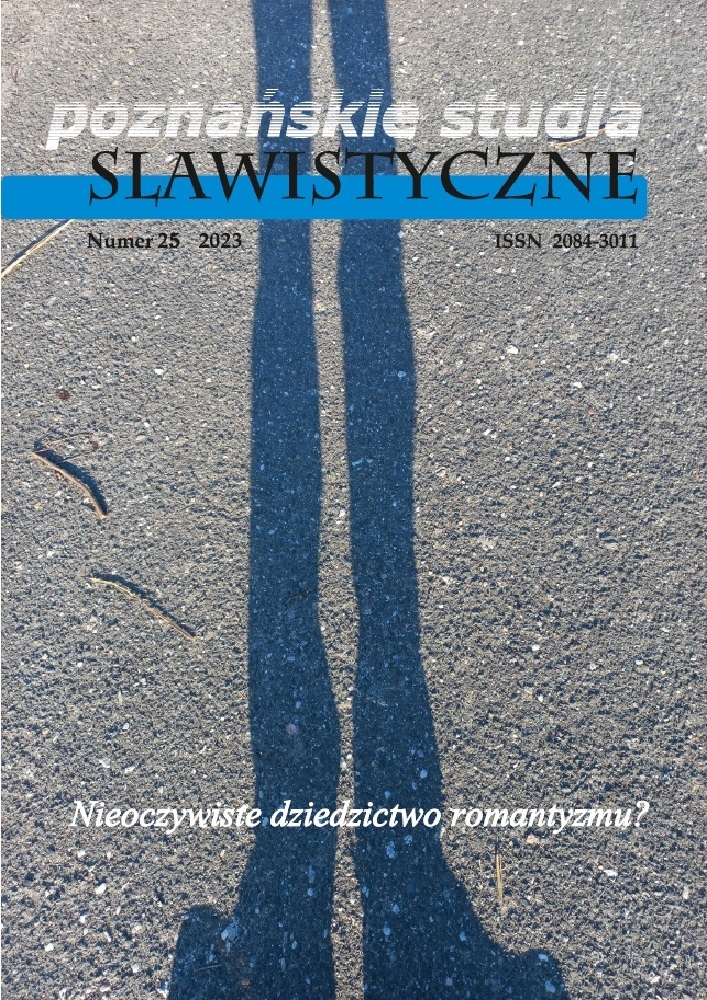Abstrakt
Put na Plitvice (The Road to Plitvice, 1860) is the first of the travelogue in Croatian language describing an expedition to the Croatian Lake District. The work of art is of significant “world-creating” and “culture-creating” value, introducing the Plitvice Lakes into the Croatian national text and into the national landscape, hence the biblical allusion in the title. It will therefore be a world-creating narrative, of bringing into existence and therefore giving a symbolic dimension of the work of art.I focus on the landscape-painting aspects of the text, understanding landscape as the manner of constructing and formulating the world, as a way of perceiving and incorporating it into cultural traditions. It is therefore rough, monumental, wild like a traversed space, which should be included in the category of picturesque and sublimity. Veber’s representation of nature illustrates how it was seen at the time within the framework of the national-revival programmes
Bibliografia
Atkinson, D., Jackson, P., Siblez, D., Washbourne, N. (eds.), (2005). Cultural Geography. A Critical Dictionary of Key Concepts. London–New York: I.B. Tauris & Co Ltd.
Badurina, N. (2009). Nezakonite kćeri Ilirije. Zagreb: Centar za ženske studije.
Berleant, A. (1997). Living in the Landscape. Toward an Aestetics of Environment. Lawrence: University Press of Kansas.
Burkot, S. (1988). Polskie podrózoposarstwo romantyczne. Warszawa: PWN.
Cosgrove, D. (1985). Prospect, perspective, and the evolution of the landscape idea. “Transactions of the Institute of British Geographers,” no. 10, pp. 45–62. DOI: https://doi.org/10.2307/622249
Cosgrove, D. (1998). Social Formation and Symbolic Landscape. London: Croom Helm, Wisconsin: The University of Wisconsin Press.
Cosgrove, D. (2003). Landscape and the European Sense of Sight – Eying Nature. In: Handbook of Cultural Geography. Eds. K. Anderson, M. Domosh, S. Pile, N. Thrift. London: Sage Publications.
Don, M. (2005). Landscape. In: Cultural Geography. A Critical Dictionary of Key Ideas. Eds. D. Sibley, P. Jackson, D. Atkinson, N. Washbourne. London: I.B. Taurus, pp. 48–56.
Frydryczak, B. (2013). Krajobraz. Od estetyki „the picturesque” do doświadczenia topograficznego. Poznań: Wydawnictwo PTPN.
Frydryczak, B. (2014). O dwóch sensach krajobrazu. In: Krajobraz kulturowy. Eds. B. Frydryczak, M. Ciesielski. Poznań: Wydawnictwo PTPN.
Gennep van, A. (1981). Les rites de passage. Paris: Éditions A. Et J. Picard.
Gilpin, W. (1974). Esej I. O pięknie malowniczym. In: Teoretycy, artyści i krytycy o sztuce 1700–1870. Eds. E. Grabska, M. Poprzęcka. Warszawa: PIW.
Hamerski, W. (2021). Romantyczne „kuźnie natury” w perspektywie ekokrytyki.“Porównania,” no. 2 (29), pp. 41–61. DOI: https://doi.org/10.14746/por.2021.2.3
Ingold, T. (2000). The Perception of the Environment: Essays on Livelihood, Dwelling and Skill. London: Routledge. Ingold, T. (2014). Czasowość krajobrazu. Trans. B. Frydryczak. In: Krajobrazy. Antologia tekstów. Eds. B. Frydryczak, D. Angutek. Poznań: Wydawnictwo PTPN.
Janion, M. (2000). Kuźnia natury. In: Prace wybrane. Vol. 1: Gorączka romantyczna. Kraków: Universitas, pp. 275–322.
Johnston R.J. et al. (2009). The Dictionary of Human Geography. Malden: Blackwell.
Kowalczykowa, A. (1982). Pejzaż romantyczny. Kraków: Wydawnictwo Literackie.
Mitchell, D. (2005). Landscape. In: Cultural Geography. A Critical Dictionary of Key Concepts. Ed. David Atkinson et al. London–New York: I.B. Tauris & Co Ltd., pp. 48–56.
Pieniążek-Marković, K. (2022). Podróż wokół pstrągów: Put na Plitvice Adolfa Vebera Tkalčevicia. Tekstotwórcza rola motywów kulinarnych. „Poznańskie Studia Slawistyczne,” no. 23, pp. 111–128. DOI: https://doi.org/10.14746/pss.2022.23.5
Pratt, M.L. (2011). Imperialne spojrzenie. Pisarstwo podróżnicze a transkulturacja. Trans. E.E. Nowakowska, Kraków: Wydawnictwo Uniwersytetu Jagiellońskiego.
Propp, W. (2011). Morfologia bajki magicznej. Kraków: Nomos.
Sławek, T. (1993). Kraina Jezior. William Wordsworth i romantyczna hermeneutyka ‘miejsca’. In: Znajomym gościńcem. Prace ofiarowane Profesorowi Ireneuszowi Opackiemu. Eds. T. Sławek, with contributions A. Nawarecki, D. Pawelec. Katowice: Wydawnictwo Uniwersytetu Śląskiego.
Söderström, O. (2005). Representation. In: Cultural Geography. A Critical Dictionary of Key Concepts. Ed. David Atkinson et al. London–New York: I.B. Tauris & Co Ltd., pp. 11–15.
Veber Tkalčević, A. (1998). Put na Plitvice. In: Odabrana proza. Vinkovci: Riječ. Wiśniewski, M. (2012). Kraina czystych efektów. “Literatura na Świecie,” no. 9–10, 347–370.
Wordsworth, W. (1951). AGuide through the district of the lakes in the north of England. With a description of the scenery, and c. for the use of tourists and residents. London: Hart-Davis.
Woźniakowski, J. (1995). Góry niewzruszone. O różnych wyobrażeniach przyrody wdziejach nowożytnej kultury europejskiej. Kraków: Znak.
Licencja
Prawa autorskie (c) 2023 Krystyna Pieniążek-Marković

Utwór dostępny jest na licencji Creative Commons Uznanie autorstwa – Bez utworów zależnych 4.0 Międzynarodowe.

